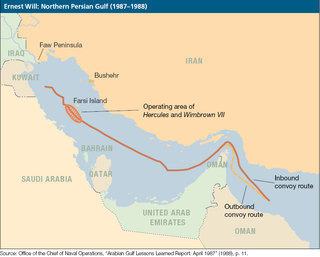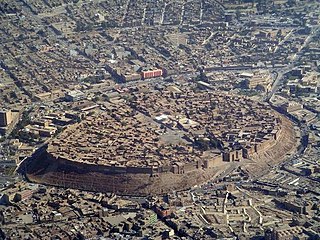
United Nations Security Council Resolution 688, adopted on 5 April 1991, after receiving letters from the representatives of France, Iran, and Turkey and expressing its concern over political repression of the Iraqi people, including those in Iraqi Kurdistan, the Council condemned the repression and demanded that Iraq, as a contribution to removing the threat to international peace and security, end the repression and respect the human rights of its population.

United Nations Security Council resolution 479, adopted unanimously on 28 September 1980, after reminding Member States against the use of threats and force in their international relations, the Council called upon Iran and Iraq to immediately cease any further uses of force and instead settle their dispute through negotiations.

United Nations Security Council resolution 514, adopted unanimously on 12 July 1982, after recalling Resolution 479 (1980) and noting the mediation efforts by the Secretary-General, Organisation of the Islamic Conference and the Non-Aligned Movement, the council expressed its deep concern at the prolonged conflict between Iran and Iraq.

United Nations Security Council resolution 522, adopted unanimously on 4 October 1982, after recalling Resolution 479 (1980) and Resolution 514 (1982), the council called for an immediate ceasefire between Iran and Iraq, calling for the withdrawal of both sides to their internationally recognised borders.

United Nations Security Council resolution 552, adopted on 1 June 1984, after hearing complaints from Bahrain, Kuwait, Oman, Qatar, Saudi Arabia and the United Arab Emirates regarding attacks on their ships by Iran, the Council condemned the attacks, reiterating that Member States should refrain from using threats or use of force in their international relations.

United Nations Security Council resolution 582, adopted unanimously on 24 February 1986, after noting that the council had been seized for six years and the continued conflict between Iran and Iraq, the council deplored the initial acts that started the Iran–Iraq War and continuation of the conflict.

United Nations Security Council Resolution 588, adopted unanimously on 8 October 1986, after expressing concern at the continuation of the conflict between Iran and Iraq, the Council urged both countries to implement Resolution 582 (1986) without delay.

United Nations Security Council resolution 598 S/RES/0598 (1987), adopted unanimously on 20 July 1987, after recalling Resolution 582 and 588, called for an immediate ceasefire between Iran and Iraq and the repatriation of prisoners of war, and for both sides to withdraw to the international border. The resolution requested Secretary-General Javier Pérez de Cuéllar to dispatch a team of observers to monitor the ceasefire while a permanent settlement was reached to end the conflict.

United Nations Security Council Resolution 612 was adopted unanimously on 9 May 1988. After considering a report by the Special Mission that was dispatched by the Secretary-General to investigate the alleged chemical warfare that had been occurring in the Iran–Iraq War, the council confirmed the use of chemical weapons and issued a condemnation on the grounds that the usage of these weapons ran contrary to states' obligations under the Geneva Protocol.

United Nations Security Council resolution 619 was a resolution adopted unanimously on 9 August 1988 by the United Nations. The resolution came after recalling Resolution 598 (1987) and approving a report by the Secretary-General Javier Pérez de Cuéllar on the implementation of paragraph 2 of Resolution 598.

United Nations Security Council resolution 620, adopted unanimously on 26 August 1988, after recalling Resolution 612 (1988) which found evidence of the use of chemical warfare between Iran and Iraq, the Council again condemned the use of such weapons, in violation of the Geneva Protocol.

United Nations Security Council resolution 631, adopted unanimously on 8 February 1989, after recalling resolutions 598 (1987) and 618 (1988) and having considered a report by the Secretary-General Javier Pérez de Cuéllar on the United Nations Iran–Iraq Military Observer Group, the Council decided:

United Nations Security Council resolution 651, adopted unanimously on 29 March 1990, after recalling resolutions 598 (1987), 619 (1988), 631 (1989) and 642 (1989), and having considered a report by the Secretary-General Javier Pérez de Cuéllar on the United Nations Iran–Iraq Military Observer Group, the Council decided:

United Nations Security Council resolution 676, adopted unanimously on 28 November 1990, after recalling resolutions 598 (1987), 618 (1988), 631 (1989), 642 (1989), 651 (1990) and 671 (1990), and having considered a report by the Secretary-General Javier Pérez de Cuéllar on the United Nations Iran–Iraq Military Observer Group, the Council decided:

United Nations Security Council resolution 685, adopted unanimously on 31 January 1991, after recalling resolutions 598 (1987), 618 (1988), 631 (1989), 642 (1989), 651 (1990), 671 (1990) and 676 (1990), and having considered a report by the Secretary-General Javier Pérez de Cuéllar on the United Nations Iran–Iraq Military Observer Group, the Council decided:

United Nations Security Council resolution 715, adopted unanimously on 11 October 1991, after recalling resolutions 687 (1991) and 707 (1991), the council, acting under Chapter VII of the United Nations Charter, approved plans from the International Atomic Energy Agency (IAEA) and Secretary-General Javier Pérez de Cuéllar regarding the long-term monitoring of Iraq's weapons programme, requiring it to submit "on-going monitoring and verification" of the country's dual-use facilities.

United Nations Security Council Resolution 1936, adopted unanimously on August 5, 2010, after recalling all previous resolutions on the situation in Iraq, including resolutions 1500 (2003), 1546 (2004), 1557 (2004), 1619 (2005), 1700 (2006), 1770 (2007), 1830 (2008) and 1883 (2009), the Council extended the mandate of the United Nations Assistance Mission in Iraq (UNAMI) for a further period of 12 months, until July 31, 2011.

United Nations Security Council Resolution 2001, adopted unanimously on July 28, 2011, after recalling all previous resolutions on the situation in Iraq, including resolutions 1500 (2003), 1546 (2004), 1557 (2004), 1619 (2005), 1700 (2006), 1770 (2007), 1830 (2008), 1883 (2009) and 1936 (2010), the Council extended the mandate of the United Nations Assistance Mission in Iraq (UNAMI) for a further period of 1 year.

United Nations Security Council Resolution 1830 was unanimously adopted on 7 August 2008.

United Nations Security Council Resolution 1883 was unanimously adopted on 7 August 2009.













